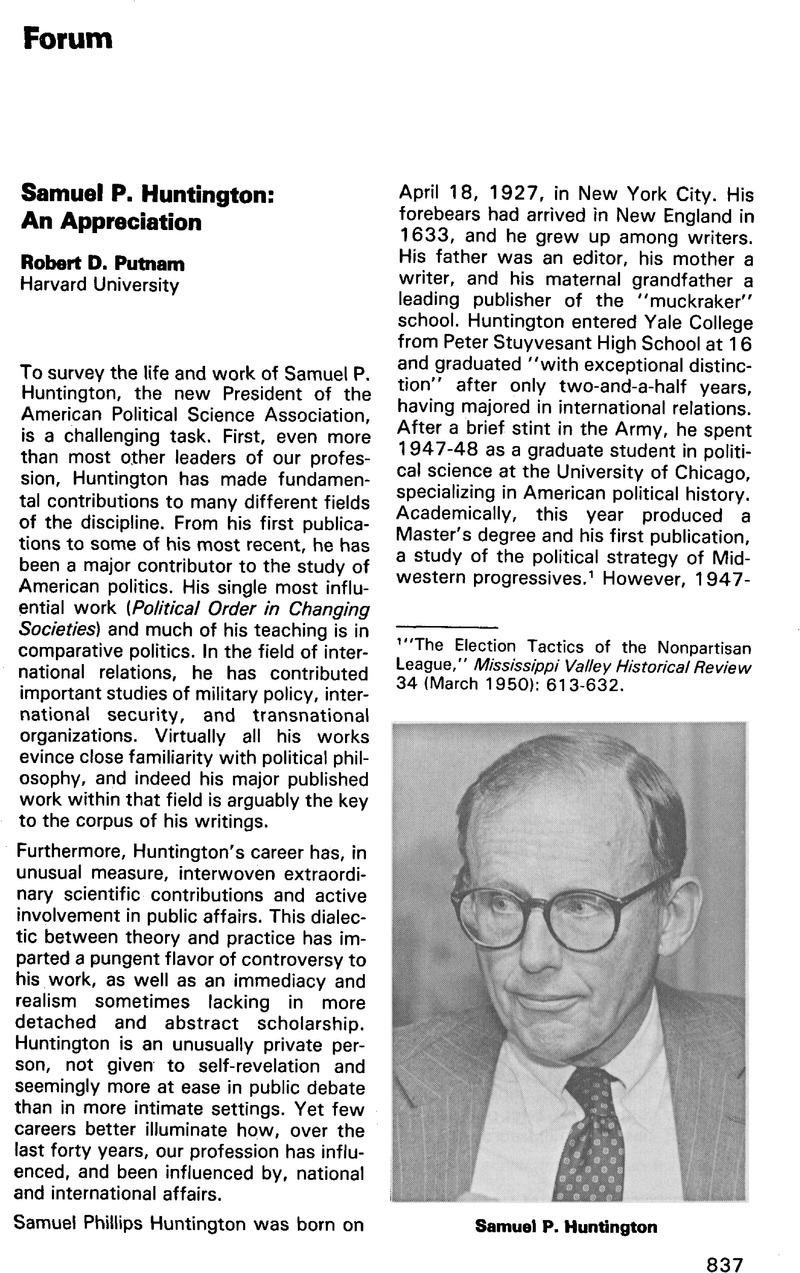Article contents
Samuel P. Huntington: An Appreciation
Published online by Cambridge University Press: 21 November 2022
Abstract

- Type
- Other
- Information
- Copyright
- Copyright © The American Political Science Association 1986
References
1 “The Election Tactics of the Nonpartisan League,” Mississippi Valley Historical Review 34 (March 1950): 613–632.
2 “The Changing Cultures of Harvard,” Harvard Bulletin (September 15, 1969), p. 52.
3 “A Revised Theory of American Party Politics,” American Political Science Review, 44 (September 1950): 669–677.
4 “The Marasmus of the ICC: The Commission, the Railroads, and the Public Interest,” Yale Law Journal, 61 (April 1952): 467–509.
5 In Truman, David B., ed., Congress and America's Future (Prentice-Hall, 1965), pp. 5–31.Google Scholar A revised edition was published in 1973.
6 “Conservatism as an Ideology,” American Political Science Review 51 (June 1957): 454–473.
7 “The Democratic Distemper,” The Public Interests 41 (Fall 1975): 23.
8 With his customary frankness, Huntington also confides to friends that the arrival of V. O. Key in the Harvard department made it seem prudent for an ambitious young assistant professor to find a field other than American politics in which to make his mark.
9 The Soldier and the State (Harvard University Press, 1957), pp. 122–23. “Arms Races: Prerequisites and Results” appeared in Public Policy 8 (1958): 41–86.
10 The Soldier and the State, pp. 464–65.
11 Columbia University Press, 1961. During this same period Huntington also edited and contributed to Changing Patterns of Military Politics (The Free Press, 1962).
12 Viking Press, 1964.
13 Humphrey's, autobiography (The Education of a Public Man [Doubleday, 1976, p. 9)Google Scholar lauds Huntington, along with (ironically) Henry Kissinger, as someone he had hoped to bring into a Humphrey White House.
14 For example, “The Visions of the Democratic Party,” The Public Interest 79 (Spring 1985): 63–78.
15 World Politics 17 (April 1965): 386–430.
16 Yale University Press, 1968.
17 Pp. 7–8.
18 Basic Books, 1970.
19 Harvard University Press, 1976.
20 “Transnational Organizations in World Politics,” World Politics 25 (April 1973): 333–368. Huntington's ideas in this field offer a convenient illustration that his scholarly insights often escape ideological pigeon-holes. As early as 1965 he wrote to another scholar, “there is the whole question—which is far from just a Marxist myth—of the impact which private economic groups have on the politics of underdeveloped countries where they have investments and on their developed home countries. This is a subject which political scientists have avoided, but my own very limited studies on Latin America convince me that it is of fundamental importance.” As quoted in Rosenau, James N., The Scientific Study of Foreign Policy (Nichols, 1980), p. 392.Google Scholar
21 “The Bases of Accommodation,” Foreign Affairs 46 (July 1968): 642–656.
22 See “Changing Cultures of Harvard.”
23 American Politics: The Promise of Disharmony (Harvard University Press, 1981), p. 180.
24 New York University Press, 1975. An abbreviated version of Huntington's contribution appeared as “The Democratic Distemper,” The Public Interest 41 (Fall 1975): 9–38.
25 “Democratic Distemper,” p. 37.
26 American Politics: The Promise of Disharmony, p. 214.
27 Much of Huntington's most interesting work during this period remains classified, but one result was published as “Economic Diplomacy,” Foreign Policy 32 (Fall 1978): 63–80.
28 Ballinger, 1982.
29 Harvard University Press, 1983.
30 As his newly-appointed aide at the NSC in 1978, I was astonished when he encouraged me to publish an article urging openminded-ness toward the Italian Communists.
- 4
- Cited by


